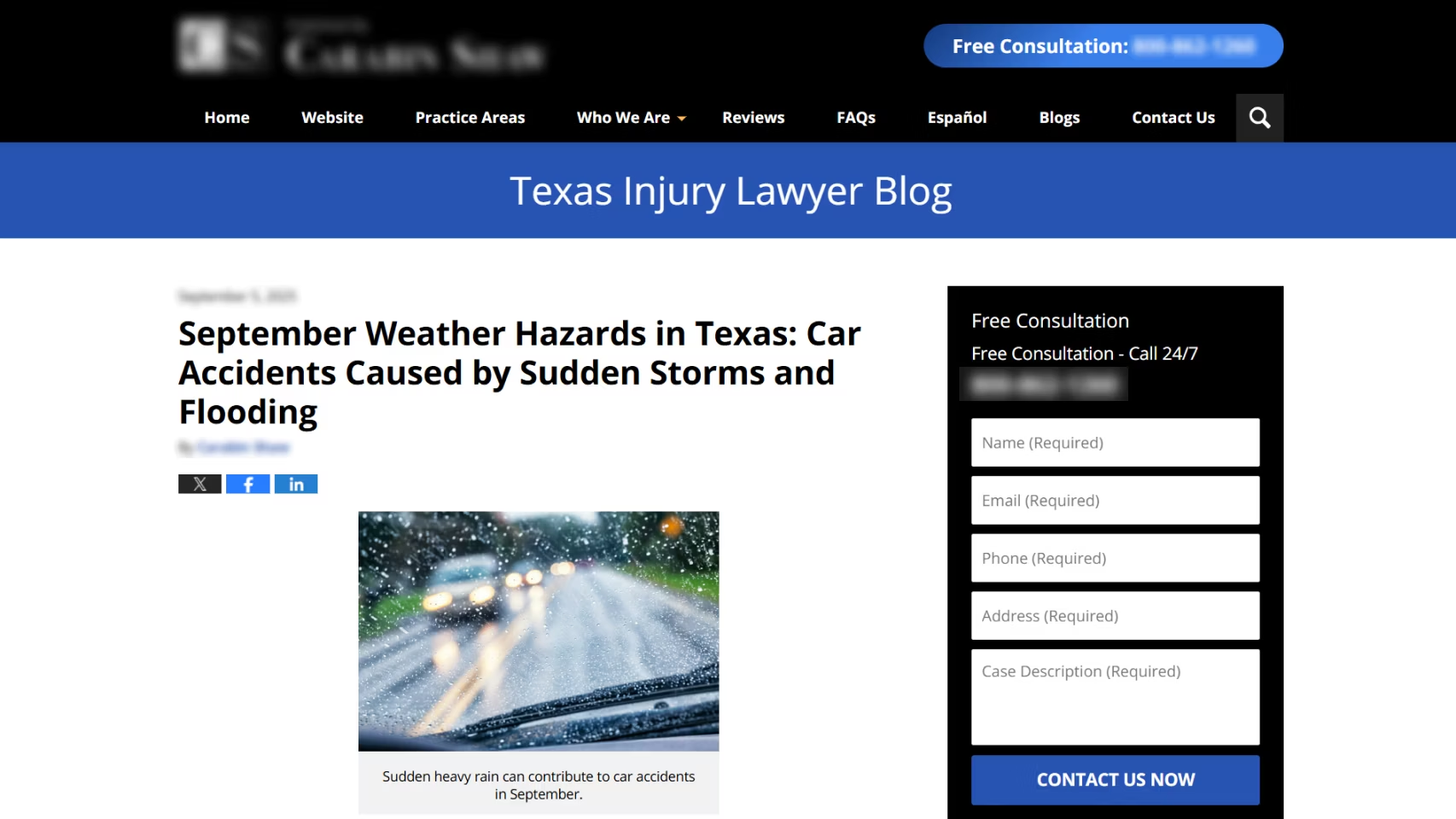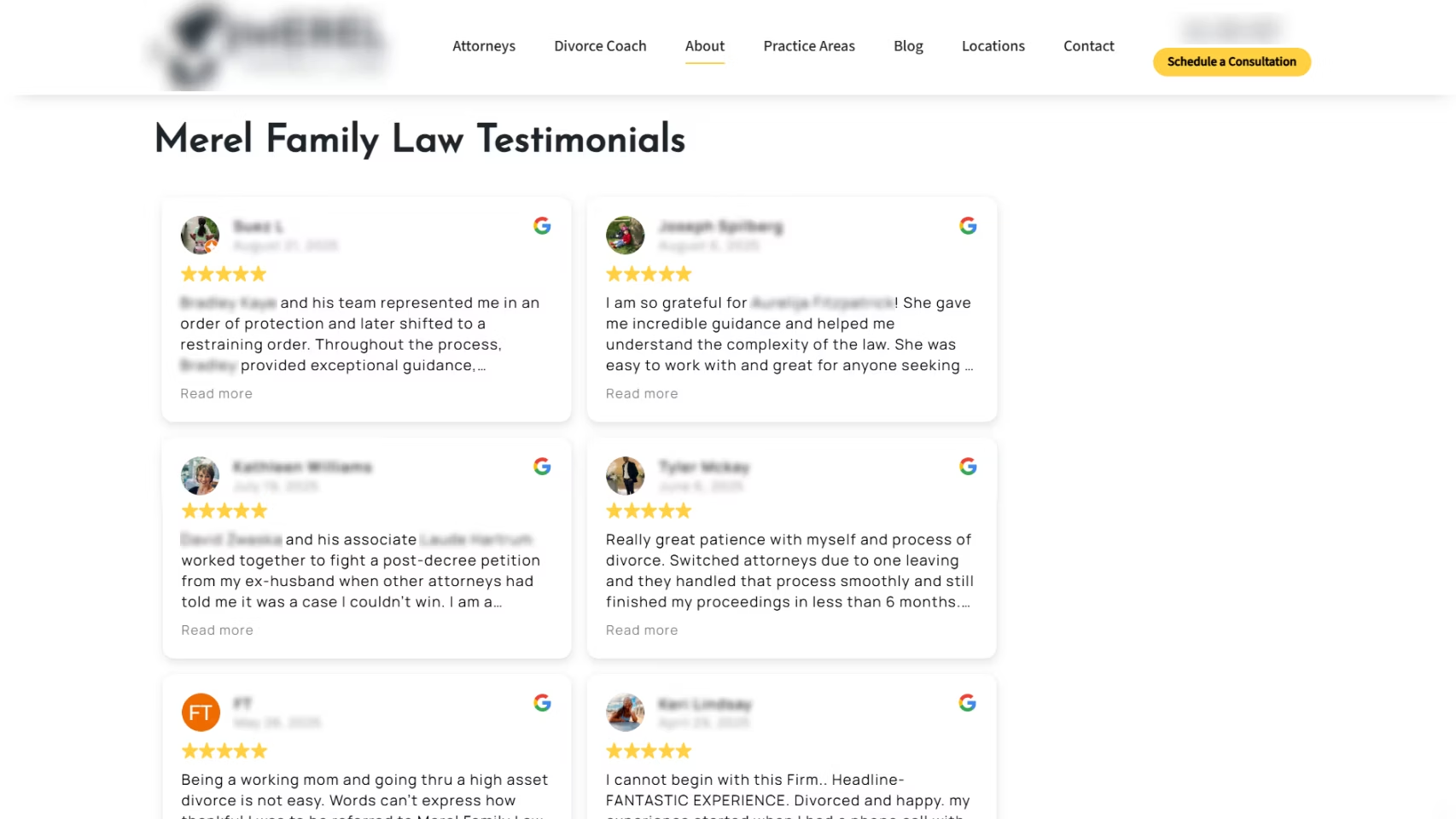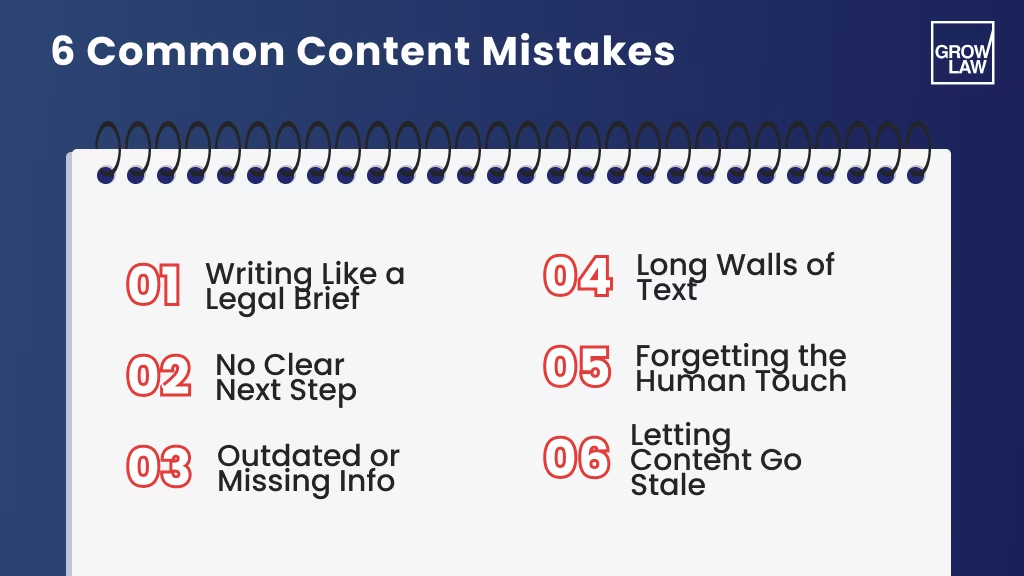Table of Contents
As a busy lawyer, you're buried in casework. Building out your website content probably keeps slipping to the bottom of your to-do list.
But here's the problem: that content gap is costing you.
Potential clients are landing on your site every day — confused, stressed, and looking for answers. If your content doesn't clearly explain what you do and why they should choose you… they're gone in seconds.
In this guide, we'll break down exactly how you can execute a highly engaging law firm website content plan that attracts clients and drives revenue — with zero guesswork needed.
Key Takeaways:
- Clear, helpful writing inspires trust and shows clients you understand their situation.
- Make your key pages easy to read, client-focused, and explain exactly how you can help.
- Use visuals and scannable formatting to keep people engaged and on your site longer.
- Updated content and client reviews help close more signed cases.
- Use legal content experts to handle writing for you so your website brings in steady leads.
Why Good Content is 'Make or Break' for Lawyer Websites
Your website is your firm's very first impression. So ask yourself: what will prospective clients think when they see it? Remember, people searching for legal help are likely anxious and desperate. They aren't just looking for your credentials; they need clear answers, reassurance, and a lawyer they can trust.
The Power of Well-Crafted Content:
- Higher Search Engine Rankings – When your content is fast-loading, easy to scan, and paired with clear calls-to-action, visitors instantly understand how you can help. This keeps them on your site longer, making them far more likely to reach out.
- Higher Trust & Credibility – Clients choose attorneys they trust. Informative, client-focused content will establish your firm as the go-to expert in your practice area.
- Higher Conversions – As we said, if your content is persuasive, visitors are more likely to take the next step — i.e., contacting your firm. That's why 90% of all companies use content in their marketing efforts!
Case in Point: Cameron Law
In April 2024, Cameron Law came to us with a clear challenge: their website wasn’t bringing in qualified leads. The outdated structure, weak CTAs, and poor SEO (search engine optimization) left them relying on unpredictable referrals. By overhauling their site content and SEO strategy, the results were staggering. They saw a:
- 333% increase in qualified leads
- 1,011% lift in conversion rate
That’s the power of strategic content for lawyer websites! It’s more than words on a page. It’s the foundation for your case flow, reputation, and growth.
7 Must-Have Pages for Your Law Firm's Website
Think of your law firm's website as a courtroom. Every piece of content is 'evidence', building the case for why a client should choose you.
Weak content? You lose them. Missing content? You lose them. But with the right mix — persuasive practice pages, compelling case studies, and clear next steps — you make an airtight argument that wins their trust.
Here's what your website needs:
— Home Page
How many times have you clicked on a website and bounced in 5 seconds because something felt off about the home page?
For high-stakes clients (DUIs, criminal charges, or personal injuries), the homepage may be the only page they look at. If they don’t like what they see, they’re gone... just like that. Make them stay longer with:
- A headline that tells them you can handle their exact problem.
- A visible CTA like “Book a Free Consultation.”
- Quick proof points like experience, client reviews, and case wins.
— Practice Area Pages
Does your law firm have dedicated lawyer landing pages for each practice area you specialize in?
When someone is facing a DUI charge, a custody battle, or a contract dispute, they don't just search for “lawyer near me.”
They want a DUI defense attorney, a family lawyer, or a business litigation expert, someone who specializes in their exact legal issue. Make it crystal clear what you do.
Bonus tip: Juice up your law firm website content with infographics and law firm videos to make your pages more engaging and shareable.

— Attorney Bio Pages
People hire lawyers, not law firms.
One of the most clicked parts of any law firm website is, you guessed it, the attorney bios! Clients want to know who is actually handling their case. Strong bio pages go beyond a welcoming headshot and a law school name. They include:
- Career highlights and achievements.
- A few words about your background and approach.
- Testimonials or case notes that show your track record.
Marketing for law firms should involve a human aspect to it. Attorney bios are a great way to achieve this.
— Case Results
Nothing builds trust faster than good ol' fashioned proof.
Anyone can say “we fight for our clients”, but can you prove it? Case results and reviews are that rock-solid endorsement! For example:
- A personal injury firm might share a 6-figure settlement for a denied claim.
- A criminal defense lawyer might highlight charges dismissed for a wrongfully accused client.
Pair those wins with real client testimonials and (boom!) you’ve got instant credibility. Just keep names and details confidential where necessary.

— Contact Page & Intake Forms
Ever tried to get in touch with a business and felt like you were running in circles? Don’t let that be your firm. If someone is ready to reach out, your contact page should make it effortless.
That means:
- Clear phone number, email, and office hours.
- A simple, mobile-friendly contact form.
- Intake forms that gather the right info up front. And don’t forget a strong call to action: “Schedule Your Free Consultation Today.”
— Blog, Info Hub, and FAQs
Potential clients are anxious. They're searching for answers to real questions like “What happens after a DUI arrest?” or “How long does a personal injury case take?”
A helpful blog and FAQ section on your website can calm fears, gain their trust early, and keep visitors engaged long enough to reach out for help!
Want a deeper strategy to create blog content that converts? Check out our Law Firm Content Marketing Guide.

— Location Pages
Do you serve more than one city or region? Spell it out! Each location should have its own dedicated page with:
- Local landmarks or neighborhoods your office is near (“Our Dallas office is just minutes from the courthouse and Deep Ellum”).
- Courts and legal institutions you practice in front of, so clients know you understand the local system.
- Directions, parking info, and public transit options to make it easy for someone to actually visit you.
- City-specific laws or regulations that matter for your practice areas.
Reassure clients you’re not just “in the area,” you’re part of their community and ready to help.

Your Website Is Your Opening Argument — Make It Convincing
Before a prospective client calls or even cares to remember your name, they judge your website.
There are hundreds of lawyers in your city. Your content should make a strong case for why they should choose you.
Here are 4 key objectives your content must accomplish.
— Objective #1: Assure Visitors They're in the Right Place
Great website content should instantly assure visitors they’re in the right place. When your pages clearly explain what you do, who you help, and why you’re the best fit, people stay longer and are more likely to contact you.
Want help improving visibility? Our SEO for Lawyers Guide shows how optimized content gets the right clients to your site.
— Objective #2: Put Your Law Firm Top of Mind
Clients rarely hire the first name they see. You need strong law firm branding to stand out. Pair that with consistent, authoritative content to position your firm as a trusted legal resource. Blog posts, FAQs, and thought leadership pay off when prospects are ready to choose a lawyer.
— Objective #3: Turn Website Visitors into Paying Clients
Think of your site as a virtual consultation...it speaks on your behalf. Every page should educate, instill confidence, and drive action. Strong calls to action like “Talk to a Lawyer Now” or “Get Your Free Case Evaluation” are wonderful to turn readers into leads.
— Objective #4: Ensure the Right Clients Reach Out
Not every lead is a good lead. If you’re a personal injury lawyer who only handles auto accidents, calls about workplace injuries are pointless. That’s why long-form content and detailed practice area pages matter. By spelling out exactly what types of cases you handle, you’ll avoid wasting time on the wrong types of inquiries.
How to Create 'Client-Centric' Law Firm Website Content
Potential clients can form an opinion in just 50 milliseconds — yes, milliseconds!
If your content doesn't grab attention fast, they'll move on to the next firm. Clear, engaging, and client-focused content isn't just nice to have — it's crucial to building trust and increasing your consultations.
— Format Your Law Firm's Website Content for Easy Reading
When writing law website content for potential clients, clarity is key.
For example, rather than an in-depth breakdown of inheritance law, a more engaging approach could be a step-by-step guide on writing a will or common probate mistakes to avoid.
The goal? Make complex legal topics simple and actionable so visitors feel empowered, not overwhelmed.
Writing Best Practices for Law Firm Websites:
- Structure with purpose – Break your content into clear sections using headings and subheadings. This guides readers and makes it effortless to find the answers they’re looking for.
- Use lists for clarity – Bullet points and numbered lists help simplify complex legal topics, making information easy to scan at a glance.
- Keep it concise and skimmable – Aim for short sentences (20–25 words max) and tight paragraphs (4–5 sentences). Break longer articles into sections no more than 300–350 words each to keep readers engaged.
- Typography matters – Choose professional, legible fonts with enough spacing to avoid visual clutter. Clean typography makes your site feel credible and easy on the eyes.
- Add visuals – Use images, icons, infographics, or short videos to explain complicated ideas and break up text-heavy pages.
- Cite authoritative sources – Linking to statutes, case law, or industry reports builds trust and positions your firm as reliable.
- Proofread everything – Typos and grammar mistakes can undercut your credibility. Use tools like Grammarly or have a second set of eyes review content before it goes live.

Strong content isn’t just about what you say, it’s about how you say it.
— Write for Audiences First, Search Engines Second
While SEO is essential for visibility, no amount of keyword optimization or keyword research will matter if your content doesn't connect with potential clients.
Think about it: If someone lands on your website with a legal concern, they're looking for answers — not a wall of legal jargon stuffed with keywords.
How to Balance SEO and User-Friendly Content:
- Use natural language – Write like you're speaking to a client in a consultation, not drafting a legal brief.
- Strategically place keywords – Integrate search terms naturally instead of forcing them into every sentence.
Bad Example (Keyword Stuffing):
"If you need a divorce lawyer in Miami, our Miami divorce lawyer team has the experience you need. Contact our Miami divorce lawyer firm today to speak with the best Miami divorce lawyer for your case."
Good Example (Natural Integration):
Considering a divorce in Miami? The process can be overwhelming, but working with an experienced Miami divorce lawyer ensures you understand your rights and options.
- Address client needs directly – Focus your content marketing on the problems your audience faces and position your firm as the solution. For example, a DUI defense page should explain potential penalties, then show how your representation can protect their future.
At the end of the day, Google's algorithm favors sites that provide a great user experience.
— Tap Into the Power of Case Studies and Testimonials
Imagine this: A potential client is searching for an attorney, overwhelmed by options.
They don't just want a law firm's expertise — they want proof that you've won cases like theirs before. That's where case studies and testimonials come in.
- Case Studies: Think of these as your firm's highlight reel. Detail a past case, the challenge, your strategy, and the outcome. For example, “We secured a $1.2 million settlement for a personal injury client after the insurance company initially offered just $50,000.” Real numbers make an impact.
- Client Reviews: 72% of people say positive reviews make them trust a business more. A heartfelt quote like “Thanks to [Your Firm], I kept custody of my kids and got a fresh start” can resonate more than any sales pitch.

- Video Testimonials – Written reviews are powerful, but seeing and hearing a real client share their story is even more compelling.
At Grow Law, we created a dedicated video testimonials page for one of our clients that featured short, authentic clips of past clients. Prospects connected instantly, and the firm saw a noticeable lift in conversions.
— Keep Your Writing Style Consistent
Every law firm has a unique personality — your content should reflect that. In the content creation process itself, make sure you follow a consistent writing style. This builds trust, reinforces professionalism, and makes your firm instantly recognizable.
- Set the Tone: Are you authoritative and formal, or approachable and client-friendly? For example, a corporate law firm may use precise, no-nonsense language, while a family law practice may adopt a more empathetic tone.
- Keep it Clear: Legal content should be easy to read. Avoid jargon that confuses potential clients — explain complex topics in a way that feels accessible, not intimidating.
- Be Consistent Everywhere: Your website, blog, emails, and social media platform profiles should all feel like they come from the same firm. Use the same voice, formatting, and branding elements to create a seamless experience.
When your writing style is consistent, potential clients will remember who you are, and more importantly, why they should choose you.
— Quality Matters: Why Your Law Firm Web Content Must Be Exceptional
High-stakes legal decisions require trust. Your website content should show visitors they’re safe in your hands. Focus on:
- Real Expertise — Share practical guidance and case insights that prove you know this area of law.
- Authority Signals — Reference credible sources and include attorney credentials where they matter.
- Accuracy & Freshness — Update pages as laws change so clients always get correct information.
- Clarity & Reassurance — Write in plain English to make complex legal steps feel manageable.
These elements align with Google’s E-E-A-T standards, but more importantly, they help clients feel confident choosing you.
— Incorporate Clear Calls-to-Action (CTAs)
A great law firm website informs — but a strategic website converts. Your content should guide visitors toward action with clear, compelling calls to action (CTAs).
- Be Direct & Actionable – Tell visitors exactly what to do next. Instead of vague phrases like Learn More, use "Schedule a Free Case Review" or "Get Legal Help Today."
- Create a Sense of Urgency – People searching for legal help often need immediate assistance. CTAs like "Act Now Before Deadlines Pass" or "Limited Appointments Available" encourage faster decisions.
- Make It Easy – Place CTAs prominently on every page — at the top, within content, and at the bottom. Use buttons with contrasting colors that stand out.
- Address Client Concerns – Reinforce trust in your CTA: "No Win, No Fee Consultations", "Speak to an Attorney in 24 Hours", or "100+ 5-Star Reviews — See Why Clients Trust Us."
- Design User-Friendly Contact Forms – A clunky form can cost you leads. Keep it short (name, contact info, brief case details), mobile-friendly, and easy to complete in under a minute. The smoother the process, the more likely visitors are to reach out.
.avif)
A well-placed, well-worded CTA turns a curious visitor into a paying client — don't leave them hanging.
— Use Visuals in Your Legal Content Writing
Walls of text can be overwhelming — especially for clients navigating complex legal issues. Break it up with visuals that educate, engage, and convert.
- Infographics Simplify Legal Jargon – Turn dense laws and processes into easy-to-follow visuals. Example: "The Personal Injury Claim Process in 5 Steps."
- Videos Humanize Your Firm – A short attorney introduction video or a client testimonial clip helps prospects connect with you before they even call.
- Case Study Graphics Add Credibility – A before-and-after case result graphic shows the real impact of your firm's work.
- Courtroom Animations Explain Complex Cases – Help potential clients understand their rights with engaging explainer videos.
- Images Strengthen Your Brand – Photos and visuals should reflect your firm’s professionalism, values, and personality. Choose wisely. Your visuals are part of your brand identity.
- Optimize for Speed – Even the best visuals fail if they slow down your site. Always compress and optimize images so they load quickly. A slow website frustrates users and can send potential clients straight to a competitor.

The legal field is full of nuance and complexity. Visuals make your content easier to digest and more likely to convert.
— Make Your Website Content Mobile-Friendly
Over 50% of organic traffic now comes from mobile devices. Which is why:
- Responsive design matters – Your legal assistance website should automatically adapt to different screen sizes, making it easy to read and navigate whether someone’s on a phone, tablet, or desktop.
- Speed is critical – Mobile users have short attention spans. If your pages take too long to load (more than 3 seconds), they’ll bounce and head straight to a competitor.
- Prioritize clarity and readability – Long paragraphs and dense text don’t translate well to small screens. Use short sentences, white space, and clear subheadings so your content is effortless to skim.
- Commit to accessibility – A mobile-friendly site isn’t just convenient; it also demonstrates your firm’s commitment to accessibility and inclusivity, helping you connect with a broader client base.
Learn how to get a sleek, fast-loading mobile site here: Mobile-Friendly Website for Lawyers.
— Avoid Duplicate Content: Protect Your Rankings & Original Work
Duplicate content can hurt your website's visibility, even if Google doesn't penalize it outright.
- Give every page a unique purpose (no copy-pasting across practice areas or locations).
- Write original, tailored copy that speaks to the specific service, city, or attorney featured.
- Keep content focused and distinct so visitors can quickly find the answers they need.
Your website is foundational to your firm's online presence. Use these legal tips to make sure it's protected.
— Keep Your Website Fresh: Regularly Update Content
A stagnant website can hurt your law firm's credibility and rankings. Search engines and users favor fresh, accurate, and up-to-date legal information.
How to Keep Content Fresh:
- Update relevant blog posts with recent cases and legal updates
- Refresh practice area pages with new insights
- Highlight firm news, awards, and client success stories
A well-maintained website and content strategy signal authority and keep clients engaged. Don't let yours collect dust!
6 Common Law Firm Website Content Mistakes to Avoid

Even strong firms lose leads because of simple content mistakes. Here are some of the biggest ones to watch out for:
1. Writing Like a Legal Brief
Overly formal language or legal jargon can confuse and overwhelm readers. Use plain, conversational language that feels helpful — not intimidating.
2. No Clear Next Step
Visitors need direction. If your pages don't have clear calls to action like “Book a Free Consultation,” you're leaving conversions on the table.
3. Outdated or Missing Info
Old office hours, wrong phone numbers, or buried contact forms break trust fast. Keep everything current and easy to find.
4. Long Walls of Text
If your content isn't scannable, most people won't read it. Use short paragraphs, bullet points, and headings to keep readers engaged.
5. Forgetting the Human Touch
Clients want to feel understood. Don't be cold and robotic — introduce your legal team, share your mission, and show empathy.
6. Letting Content Go Stale
Laws and client needs evolve. If your last blog post is from 2021, it's time for an update. Keep checking your Google Analytics to look for engagement drops or ranking drops and update accordingly.
Avoid these pitfalls, and your website will not only inform — it will convert.
Who Should Write Content For Your Website? (Hint: Probably Not You)
As a lawyer, you're an expert in the courtroom — not necessarily in content creation. While many attorneys are skilled writers, legal content writing requires SEO expertise, audience targeting, and clarity that goes beyond legal jargon.
How to Simplify the Process
- Don't waste billable hours writing or reviewing every blog post.
- Don't rely on AI bots or low-cost ghostwriters who lack legal expertise.
- Do outsource to expert legal writers who understand law firm SEO.
- Do consider hiring a legal marketing agency that can create effective law firm content.
Hiring a trusted marketing team to promote your firm's services saves you time and delivers clear, client-focused, and search-optimized content to bring in leads.
Win More Clients with an Expert Law Firm Website Content Team!
As a busy lawyer, your plate is full. You're managing clients, handling cases, and chasing court deadlines. The last thing you have time for? Writing website content, chasing SEO rankings, and figuring out what Google wants.
That's where we come in.
At Grow Law, we bring a results-first, ROI-focused approach to legal marketing. Our 50+ team of specialists delivers law firm SEO services, PPC, web design, and content creation plans — so you can stay focused on doing what you love; practicing law.
We don't just boost your visibility. We give you high-converting content that attracts better leads and signs more clients — aiming for up to 400% return on your investment.
Request Your Free Growth Plan Today
Need more time to decide?
Explore the Next Article → Local SEO for Lawyers: A 2026 Guide to Win More Clients in Your Neighborhood
This was made for you! See how to attract high-intent clients with these 10 proven local SEO tips.










